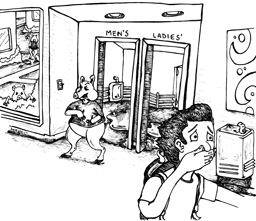By Daniella Solis/entertainment editor
Students who wanted to learn details of how to get a competitive edge when entering the work force got just that at a résumé writing workshop held April 21 on Trinity River Campus.
Kristin Vinson, TR career and employment service coordinator, told attendees the goal was to turn their résumés into winning ones.
“How is my résumé ever going to get selected for that interview?” she asked.
Knowing key words to use and proper formatting can help a person get selected for an interview, but that’s only half of the battle, she said. In the past, all a résumé needed was some key words and a person was guaranteed a job. Now employers are stricter about the way a résumé should look.
Job seekers must ensure their résumé looks nice, is free of any grammatical errors, includes all work experience and volunteerism and, most importantly, has no gaps. When employers review résumés and see a large amount of information, they will quickly eliminate any résumés with the smallest of errors.
“You want to make sure your résumé is perfect,” Vinson said.
Vinson asked attendees where they go to search for jobs and most replies were Google, Yahoo and Monster. Vinson then pointed out that Craigslist was the most popular along with Facebook and getting to know the Internet was beneficial in finding a job.
When trying to venture into another industry, using keywords from past experiences is best and if the person is younger and doesn’t have much experience, anything they did in high school can be applied.
Getting a blank sheet of paper and writing down everything a person has done in life beginning at age 18 was one recommendation Vinson had. This includes any opportunity or experience where people were in a leadership position or descriptors of who they are to start building a résumé.
“You need to know that about yourself before you can convince a hiring manager to hire you,” she said. “It’s a snapshot of who you are. … They don’t have time to talk to you for 10 or 15 minutes, so your résumé has to be a reflection of who you are.”
Lack of professionalism such as inappropriate e-mail addresses, grammar, verb tenses and punctuation mistakes are things she sees often because people don’t take the adequate time to check their résumés.
Abbreviating job duties, she pointed out was a sure way to ruin your opportunity.
“I see a lot of people abbreviating job duties, and I think it’s from texting and Twitter. But this isn’t a Tweet or text message,” she said. “This is something that needs to be a complete sentence with a noun and a verb.”
When applying for a job, studying the job description, using action words, eliminating words like hard worker and fast learner, which are considered fluff words that say nothing, is necessary. Showing a possible employer that a person can do more than what the job description asks will increase one’s chances of getting an interview, she said.
Vinson’s other tips included listing work experience in chronological order, beginning with most recent and listing all skills and computer training. Generally, if a person has less than 10 years of work experience, the résumé should be kept to one page, having a two-sentence objective and listing anticipated graduation date with the type of degree sought. Having three good references is also important.
“It’s all about the research and preparation to have a winning résumé,” she said.
Lynn Vara, a TR student, said she was eager to learn more tips on how to better prepare her resume.
“I don’t think you can ever be too well informed about résumés. I want to get some tips and strategies to make sure I am marketing myself properly,” she said.
Devontee Rayford, a TR student, was pleased with the workshop.
”It was good, and it was nice not to see a PowerPoint,” she said. “It was nice to have a packet to refer to while she was talking.”
Jairo Huaman, a TR student, was also satisfied with the workshop.
“I thought it was effective,” he said.
“It was an excellent spring board for people ready to jump-start their career.”


























